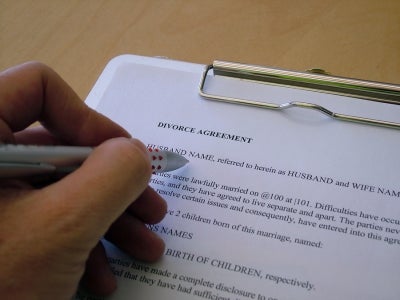-
Tips for Preparing Emotionally for Divorce
If you are considering legal separation or divorce in Owings Mills , or anywhere in the Baltimore metro region, you should consult with an experienced divorce lawyer in your area. Divorce laws are complicated, especially if there are child custody issues in consideration, and a divorce lawyer can make the process less stressful and emotional for you. Here are some helpful tips for preparing emotionally for divorce.
Don’t Obsess Over Winning Your Divorce Case
When couples begin divorce proceedings, they are often very concerned with “winning” their divorce case. In general, divorce cases involve issues of child custody, dividing assets and liabilities, and negotiating child support. It is rare that one party will get everything that he or she wants in a divorce order or child custody order. Instead of obsessing over trying to make every aspect of your divorce or child custody case go your way, you should make an attempt at divorce mediation, or discuss the possibility of an uncontested divorce with your partner.
 Be Familiar with Child Custody Laws
Be Familiar with Child Custody Laws One of the most stressful and emotional aspects of any divorce is navigating child custody issues. You can minimize your stress by consulting with a family law attorney who is experienced in child custody laws. Your divorce lawyer should carefully explain the state and federal child custody laws so that you know what to expect and won’t experience any surprises. Divorce mediation can be very helpful when dealing with complex child custody issues, and will make it easier for you and your spouse to agree upon child support and visitation. You can also seek support from a professional counselor to deal with stress you might experience.
Begin Preparing for Your Future
You will feel much more in control during your divorce proceedings if you immediately begin preparing for your future. It might be difficult, but you should avoid focusing on past mistakes, and instead construct a viable plan for your future. Make good faith attempts to work with your spouse on reaching mutually beneficial agreements regarding child custody issues and property division rather than contesting everything throughout the divorce proceedings.
-
Understanding the Requirements for a No-Fault Divorce
Maryland divorce laws allow both no-fault and fault-based divorce cases. If you inform your divorce attorney serving Owings Mills that you would like to seek a no-fault divorce, he or she will ask you if you have minor children in common with your spouse. Previously, Maryland divorce laws required spouses to prove a legal separation of one year before seeking a no-fault divorce. If only one of the spouses wanted a divorce, that time period was lengthened to two years.
However, new legislation has eased these requirements for some spouses. You may not need to prove a legal separation if you do not share minor children with your spouse. To eliminate the waiting period, you and your spouse must also mutually agree to the divorce and agree to a property division arrangement. If you and your spouse cannot meet these criteria, you can still obtain a no-fault divorce after fulfilling the legal separation requirements.
-
Could Dating During Divorce Affect Your Case?
Dating while a divorce case is pending is not advisable for a few reasons. As your lawyer in Baltimore County can explain to you, Maryland courts will allow a no-fault divorce if spouses with minor children have voluntarily lived apart each day for one year. Bear in mind that if one spouse does not want a divorce, this time period increases to two years under divorce laws in the state. Maryland family laws also allow for fault-based divorces, which do not require documentation of a legal separation. One of the grounds for a fault-based divorce is adultery.
Until your divorce is officially finalized, you are still legally married even if you have been living apart from your spouse. This means that if you begin dating prematurely, you could be considered to be an adulterer. Additionally, your spouse may introduce evidence of possible misuse of marital funds, such as by diverting martial funds to pay for expensive vacations or luxury items for your date. If this occurs, the court may consider these issues in light of whether you or your spouse is requesting spousal support.

-
Financial Mistakes to Avoid During Your Divorce
Divorce can be just as financially problematic as it is emotionally exhausting. You may wish to visit a family attorney near Pikesville before informing your spouse that you intend on filing for divorce. Your family lawyer can offer invaluable advice on protecting your bottom line during and after your divorce.
 Ignoring the Importance of Savings
Ignoring the Importance of Savings When a spouse realizes that a legal separation or divorce is the only viable solution to the breakdown of a marriage, he or she may be eager to go through with the proceedings as quickly as possible. However, it’s essential to ensure that day-to-day living expenses will be met before the court issues rulings on financial matters. Once you’ve begun a legal separation or filed for divorce, you’ll need to pay legal fees and court filing fees. You may also need to make new housing arrangements and meet your other daily expenses on your income alone. Your divorce lawyer may advise you to open a savings account under only your name to allow you to support yourself while the case is pending.
Underestimating Your Expenses
You will need to submit to the court documents pertaining to your finances, including a list of your monthly expenses. Evaluating your income and expenses with the finances of your spouse aids the court in making decisions such as spousal support and child support. One common mistake divorcing spouses often make is to underestimate their monthly expenses. Keep track of exactly where your money goes during the month. Take into consideration your future needs and your child’s needs, including major expenses such as healthcare and minor costs such as school supplies.
Failing to Secure Support Payments
If you expect to receive spousal support and/or child support, you might consider asking the court to require your spouse to obtain disability and life insurance policies. This ensures that you’ll continue to receive payments in the event your ex-spouse becomes disabled or dies.
Neglecting to Consider Shared Liability for Debt
Talk to your divorce lawyer about your marital debts. He or she will help you determine which debts you may be held liable for after the divorce. Even if your spouse is responsible for paying off a credit card, the creditor may begin collection proceedings against you if your spouse fails to make payments.
-
Dealing with Financial Issues When You Divorce Later in Life
In recent years, the percentage of individuals over the age of 50 who are going through a divorce has been on an upward trend. When you consult a divorce lawyer later in life, there are significant financial issues you should consider. Your family law attorney near Pikesville may recommend that you consult a financial planner regarding the tax consequences of any assets you might receive. Your family attorney may also recommend that you consider the possible effect of the divorce on your healthcare plan.
You can hear more factors to consider by watching this video or consulting your family lawyer. This video advises viewers to review their estate planning documents, since it’s likely that divorced spouses will need to change their beneficiaries, create separate wills, and establish separate trusts.
-
Who Gets the Family Pet When You Divorce?
The issue of the fate of a family pet during a divorce is one example of divorce laws failing to keep up with modern times. When you have a divorce attorney serving Carroll County file a petition for divorce on your behalf, the court will view the family pet as property. Beloved animals are certainly much more than mere property; however, ownership of a pet may be determined much like any other asset. This is one reason why your family law attorney may recommend that you invite your spouse to try mediation.
 Giving Mediation a Try
Giving Mediation a Try Mediation is often helpful for resolving disputes that arise during divorce. During mediation sessions, you might point out that you acquired the pet before getting married, if this is the case. Or, you might discuss how you are better suited to provide the care the animal needs. A successful outcome to mediation may be dependent upon compromise. Try to work out a visitation schedule with your spouse. For example, the pet could live with you for one month, followed by a month with your ex-spouse. If mediation does not result in a mutually agreeable arrangement, you may need to bring the matter before the judge.
Proving the Role of Primary Caregiver
Much like child custody during a divorce, you can support your claim to ownership of the pet by proving that you fulfilled the role of the primary caregiver for the animal. Begin assembling any evidence that can substantiate your claim. When you bring your animal to the veterinarian, you can ask him or her to sign a note stating that you were the one to bring the animal in, rather than your spouse. Purchase pet food and other supplies with a credit card. Save the receipts with your signature to prove that you provided for the animal. You could even ask your neighbors to write an affidavit stating that they have seen you walking your dog.
Determining the Most Suitable Caregiver
Another factor the judge may consider is which spouse is best able to care for the animal going forward. For example, if your spouse must travel frequently for work and you do not, you may be better suited to provide care. The same applies to spouses who work long hours away from home versus spouses who work out of a home office.
-
What Are the Grounds for Absolute Divorce?
Maryland divorce laws provide for limited and absolute divorce. A limited divorce is actually a legal separation; spouses are still legally married during this time. In contrast, when an absolute divorce is finalized, spouses are no longer legally married. To find out whether you can file for an absolute divorce, you can consult family lawyers serving Owings Mills.
Legal Separation
When spouses do not have any other grounds for an absolute divorce, a divorce lawyer can file for a limited divorce. The spouses must then live apart from each other for 12 consecutive months without cohabitation, unless the conditions from the paragraph below are present. When this time period ends, the spouses will have grounds for a no fault absolute divorce. It is not necessary for both spouses to consent to the divorce if the legal separation requirement has been fulfilled. However, if the spouses live together or have sexual relations even once during this time, the 12-month time period begins again.
 Mutual Consent
Mutual Consent Maryland divorce laws were recently updated to make it easier for some couples to file for absolute divorce without having to wait through a 12-month legal separation. Spouses may be eligible for an absolute divorce based on the grounds of mutual consent if they do not share any minor children and the parties submit a written settlement agreement to the court signed by both parties. The settlement agreement must resolve all divorce issues such as property distribution. Additionally, both parties must appear in court at the divorce hearing. Before the divorce is finalized, either party may choose to file a motion to set aside the settlement agreement, in which case the divorce proceeding will be halted.
Fault-Based Grounds
In addition to the grounds for a no fault absolute divorce, spouses in Maryland may choose to file for divorce based on wrongdoing. For example, a spouse may present evidence to prove that the other spouse has committed adultery, in which case the court can grant the divorce immediately. Or, a spouse may demonstrate that the other spouse has deserted the family home, engaged in cruel treatment, was convicted of a crime, or was confined to a mental institution.
-
Filing Divorce Case Motions
When you hire a family law attorney near Owings Mills, you can expect him or her to file motions on your behalf. A motion is a request of the court to issue an order. A divorce lawyer can make verbal motions while a court proceeding is underway. Outside of court proceedings, your family attorney can file written motions with the court and provide a copy of all motions to your spouse’s family lawyer.
For more information about motions in divorce cases, watch this brief video or consult your divorce lawyer. The expert in this video encourages viewers to retain legal representation, since divorce laws vary from state to state and the procedural requirements can be complex.
-
Can a Parent Change a Child’s Last Name After a Divorce?
After a divorce, either parent may petition for a change of the minor’s last name. Changing the child’s last name will not affect either parent’s legal obligations to the child, such as child custody or support. If you feel that changing your child’s last name is in his or her best interests, talk to an attorney in Owings Mills. The family law attorney can prepare and file a Petition for Name Change. If both parents consent to the name change, the petition is likely to be granted.
Bear in mind that you are legally obligated to advise the other parent of the Petition for Name Change and the other parent has the right to file an objection. If the other parent does not consent to the name change, the court will schedule a hearing to decide the matter. At the hearing, your divorce lawyer must demonstrate that the name change is in the child’s best interests. For example, your attorney might provide evidence of misconduct or abandonment by the other parent.

-
Debt and Divorce
Divorce doesn’t only take a toll on your emotional health; it can also have significant financial consequences. To minimize the financial impact of filing for divorce , your divorce attorney serving Owings Mills is likely to recommend that you close all joint accounts. If you have joint accounts that still have a balance and it is not possible to pay them off before your family lawyer files the divorce petition, you might consider talking to the creditors about freezing the accounts.
When you watch this video, you’ll learn that it may be possible for you to be held responsible for your ex-spouse’s debts after divorce, even if your name was not on the accounts. This video also explains why you should have your family law attorney include an indemnification clause in your divorce decree.
